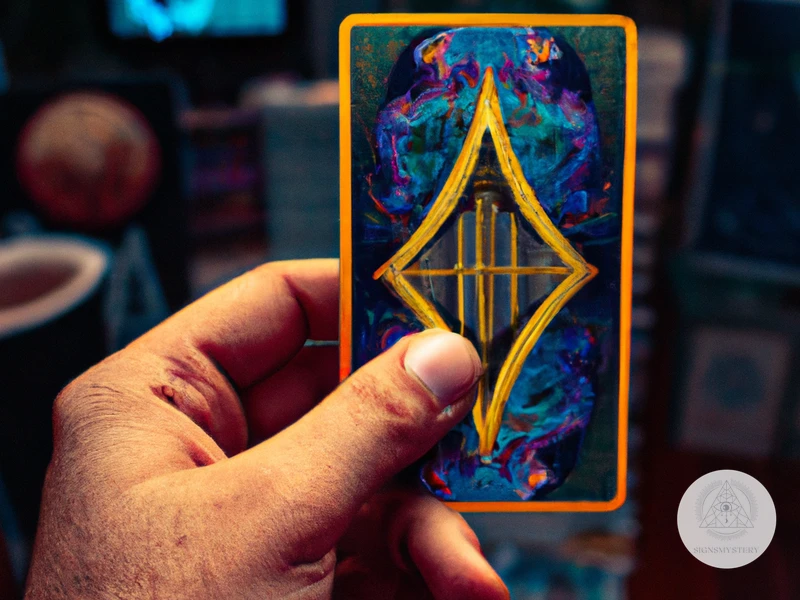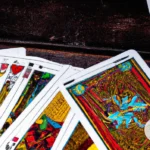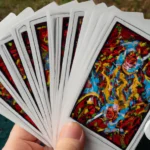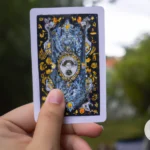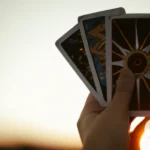As entrepreneurs, we are always seeking ways to stay ahead in the game and predict market trends. What if there was a tool that could offer insights and guidance beyond conventional business strategies? Enter Tarot Cards. Yes, you read that right – these ancient cards typically associated with fortune-telling and mysticism can also be used as a powerful tool for predicting market trends and informing business decisions. The idea of using tarot for entrepreneurship may seem unconventional, but the potential benefits are undeniable. In this article, we will take a deep dive into the world of tarot and explore how it can be harnessed to help you stay ahead in the ever-changing world of business.
What are Tarot Cards?
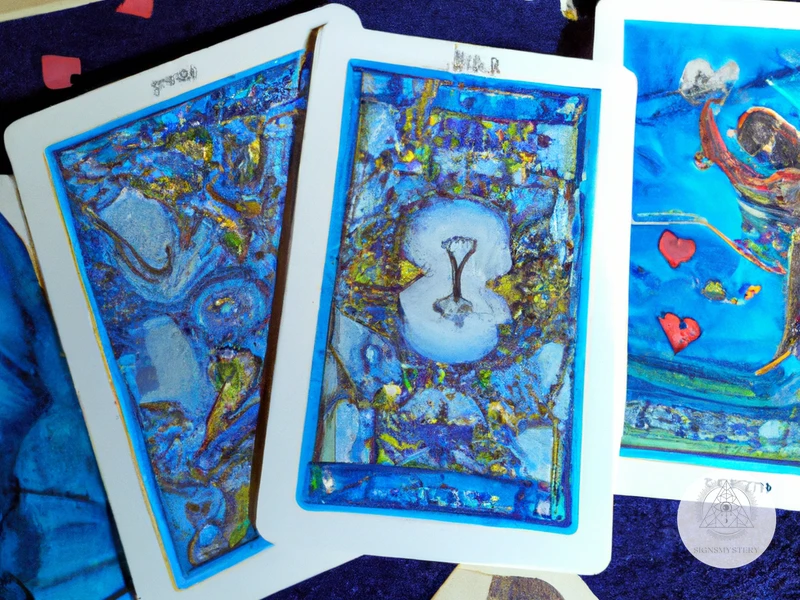
Have you heard of Tarot cards and wondered what they are all about? Tarot is often associated with divination and fortune-telling, but there’s more to it than meets the eye. Tarot has a long history and is used for various purposes, including gaining insight into personal and business matters. In this article, we’ll take a closer look at Tarot cards and their potential applications in the entrepreneurial world. Whether you’re a seasoned business owner or just starting out, gaining a new perspective through Tarot may be worth exploring. And if you’re interested in more ways to use Tarot for entrepreneurship, you can check out this article for more ideas.
A Brief History
Tarot cards have a long and interesting history, with disputed origins. Some sources suggest that Tarot originated in Egypt, while others attribute their beginnings to medieval Europe. Originally, Tarot cards were used primarily for playing games, but over time they evolved to become powerful tools for divination and personal development.
The first tarot decks appeared in northern Italy during the Renaissance period in the 15th century. These early decks were used for playing a popular card game called Tarocchi. The original decks were hand-painted luxury items that were quite expensive and only available to the very wealthy.
In the late 18th century, French occultist Jean-Baptiste Alliette, also known as Etteilla, began to use Tarot cards for divination purposes. Etteilla was a popular fortune-teller and writer who created the first Tarot deck specifically for divination. He called it the “Book of Thoth,” named after the Egyptian god of wisdom.
The 19th and early 20th centuries saw a resurgence of interest in Tarot as a tool for divination, spiritual growth, and personal development. Many new Tarot decks were created during this time, including the popular Rider-Waite-Smith deck. This deck, created by artist Pamela Colman Smith and scholar Arthur Edward Waite, is still widely used today and has become one of the most popular Tarot decks in the world.
Modern times have seen Tarot cards used not just for personal growth but also in various fields of business and entrepreneurship. In recent years, there has been a growing trend of using Tarot cards to help business owners gain insight into market trends and consumer behavior. Applying Tarot to entrepreneurship has become increasingly popular, with many entrepreneurs relying on it as a powerful tool to stay ahead of the game.
It’s clear that Tarot cards have a rich and complex history, from their origins as a luxury item for the wealthy to their current use as a tool for personal and professional development. Whether you believe in their mystical powers or not, there’s no denying that Tarot cards have had a significant impact on culture and society throughout the centuries.
How Tarot Works
Tarot is a divination tool that works based on the belief that the cards are a reflection of the subconscious mind. The idea is that the cards chosen are not random but chosen by the individual’s intuition, and the interpretation of the cards is subjective to the individual who is receiving the reading. Tarot is believed to work through a combination of symbolism, numerology, astrology, and intuition.
The tarot is composed of 78 cards, divided into two categories: Major Arcana and Minor Arcana. The Major Arcana cards represent significant life events, while the Minor Arcana cards represent the daily ups and downs of life. Each card has a unique meaning, and understanding the symbolism behind each card’s illustrations is essential in interpreting the reading.
The process of reading tarot involves the individual shuffling the deck of cards and then drawing a certain number of cards, called a spread. The spread can be as simple as one card or as complex as a sixteen-card spread. The spread’s interpretation depends on the question asked, the position of the card in the spread, and the card’s symbolism.
It’s important to note that the tarot does not predict the future but instead provides insight and guidance into a situation, allowing individuals to make informed decisions. The interpretation of the cards should not be taken as an absolute answer but should be used to understand the situation better and make the right choices.
Understanding how the tarot works is essential in incorporating it into your business strategy. Tarot has been used successfully by many startups to gain insight into the market and create successful business plans. In the next section, we will explore the reasons why tarot can be beneficial in entrepreneurship and business strategy.
Tarot and Entrepreneurship
Entrepreneurship is a path filled with uncertainty and constant decision-making. It’s not uncommon for business owners to feel lost or unsure about their next steps. However, what if there was a tool that could provide insight and guidance for these decisions? That’s where Tarot comes in. Tarot has long been used as a divination tool, but it has also proven to be a valuable resource in the world of entrepreneurship. In this section, we will explore the connection between Tarot and business strategy, including the benefits of using Tarot in decision-making and specific Tarot spreads for entrepreneurial growth. For more information on Tarot spreads, check out our article on the best Tarot spreads for career growth and entrepreneurship.
Why Use Tarot for Business?
The use of tarot cards in business may seem surprising to some, but it has gained popularity in recent years due to its effectiveness in predicting market trends and helping entrepreneurs make informed decisions. Tarot provides a unique perspective that can be used to gain clarity and insight into the complex world of business. Here are some reasons why tarot is useful in the world of entrepreneurship:
- Encourages Intuition: One of the reasons why tarot is useful in business is that it encourages entrepreneurship to tap into their intuition. This approach can be beneficial when making tough decisions that require creativity and quick-thinking.
- Provides a New Perspective: Tarot cards allow entrepreneurs to access their creative subconscious mind, providing them with a fresh perspective that can help them approach problems from a different angle.
- Assists with Decision Making: The process of selecting the cards and analyzing them can help entrepreneurs to analyze problems, visualize their goals, and ultimately make better-informed decisions for their business.
- Helps with Future Planning: Tarot cards can be used as a tool for predicting future market trends and preparing for potential obstacles. By analyzing the trends and patterns portrayed in a tarot reading, entrepreneurs can make sound preparations for the future.
Tarot can be an invaluable tool for entrepreneurs who are seeking a new perspective and want to obtain insight into complex business matters. Entrepreneurs can use tarot to make informed decisions, plan for the future, and build stronger teams. With tarot cards, business owners can take their entrepreneurship to new heights.
Benefits of Tarot in Business Strategy
The benefits of incorporating tarot into business strategy may not be immediately apparent, but they are numerous and can greatly aid in decision making and problem solving. Here are some benefits of using tarot in business:
- Increased Intuition: Tarot allows entrepreneurs to tap into their intuition, something that is often overlooked in the fast-paced and data-driven world of business. By honing intuition, entrepreneurs can make informed decisions that feel right and are more likely to have a positive outcome.
- Creative Problem-Solving: Tarot is an excellent tool for getting unstuck when faced with a difficult problem. Drawing a card or doing a spread can offer fresh perspectives and insights that may not have been considered before.
- Identifying Strengths and Weaknesses: Tarot can help entrepreneurs identify their strengths and weaknesses, as well as those of their business. This knowledge can be used to make strategic decisions about hiring, partnerships, and overall business strategy. [See more about using tarot to identify strengths and weaknesses.]
- Understanding Market Trends: Tarot can provide insights into the overall energy and trends of the market, allowing entrepreneurs to make more informed decisions about product development, marketing strategy, and more.
- Team Building: Tarot can be used as a team building exercise, helping team members tap into their intuition and work together to solve a problem. This can be especially helpful for startups and small businesses. [Learn more about using tarot for team building.]
- Manifestation: By using tarot to visualize and manifest success, entrepreneurs can set clear intentions and work towards achieving their goals with more focus and purpose. [Discover how tarot can aid in manifestation.]
By incorporating tarot into business strategy, entrepreneurs can gain a deeper understanding of their business, their market, and themselves, ultimately leading to more informed decisions and greater success.
How to Use Tarot for Market Prediction
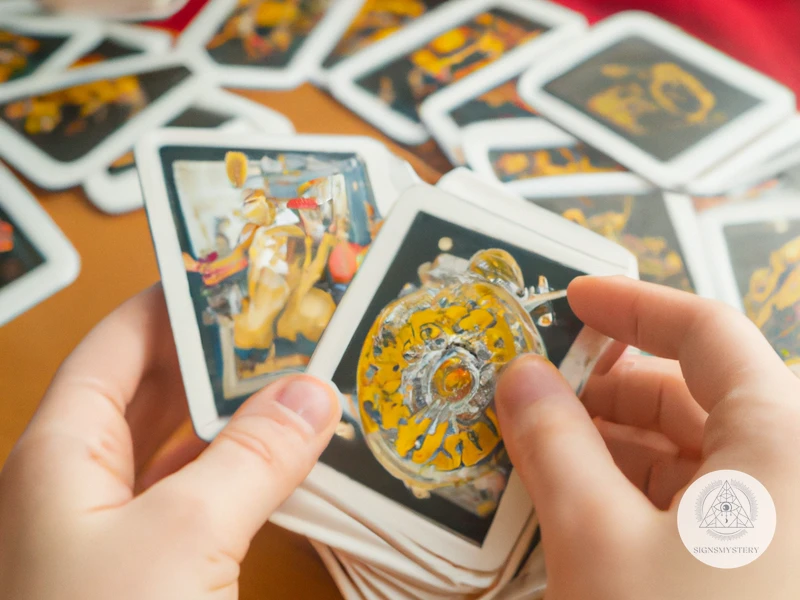
When it comes to predicting market trends and staying ahead in entrepreneurship, many tools and strategies can be employed. One such tool that has gained popularity in recent years is tarot cards. While some may view tarot as simply a means of divination, it can also be used as a tool for analyzing market trends and making informed business decisions. By tapping into the archetypal symbolism and intuitive insights of the tarot, entrepreneurs can gain a deeper understanding of the market and its potential shifts. But how exactly can tarot be used for market prediction? Let’s explore some simple yet effective ways to incorporate tarot into your business strategy.
Choosing a Tarot Deck
When it comes to choosing a tarot deck for business, there are a few things to keep in mind to ensure you find the right fit for your needs. Strong>Choosing the right tarot deck can greatly impact the accuracy and effectiveness of your readings. Here are some factors to consider:
| Factor | Considerations |
|---|---|
| Artwork | The artwork on the cards can influence your interpretation and connection to the deck. Consider whether you prefer traditional imagery or more modern designs. |
| Theme | Some tarot decks have specific themes, such as animals, nature, or mythology. Choose a theme that resonates with you and your business goals. |
| Size | The size of the cards can affect how you handle and shuffle the deck. Consider whether you prefer a larger or smaller deck based on your personal preferences and needs. |
| Guidebook | Many tarot decks come with guidebooks that provide interpretations and suggestions for spreads. Look for a deck with a guidebook that resonates with you and your business goals. |
| Reviews | Before purchasing a tarot deck, read reviews from other users to get an idea of the deck’s accuracy and effectiveness for business readings. |
Remember, the right tarot deck for your business is one that you feel a strong connection to and that helps you make accurate predictions. Take the time to explore different options and choose a deck that resonates with your intuition and business strategy.
Simple Tarot Spreads for Business
One of the ways to use Tarot cards in business is by using simple Tarot spreads. A Tarot spread refers to the arrangement of Tarot cards in a specific pattern for a specific purpose. Below are some simple Tarot spreads that can be used for business:
| Spread Name | Purpose | How to Use |
|---|---|---|
| Career Spread | To gain insight on career direction and goals | Shuffle the deck and draw three cards. The first represents the current state, the second represents potential opportunities, and the third represents the outcome. |
| Decision-Making Spread | To make decisions regarding a specific business issue | Shuffle the deck and draw two cards. The first represents the pros of a decision, and the second represents the cons. |
| Financial Spread | To gain insight on financial matters | Shuffle the deck and draw five cards. The first represents the current financial situation, the second represents potential financial opportunities, the third represents financial challenges, the fourth represents potential solutions to challenges, and the fifth represents the outcome. |
Keep in mind that these spreads should not be used as a definite answer, but rather as a tool for gaining insight and perspective. It is important to interpret the overarching theme of the cards rather than relying on a strict interpretation of each card individually.
Interpreting Tarot Cards for Market Trends
Once you have chosen a tarot deck and laid out a spread for your market trend prediction, the next step is to interpret the cards. Each card in the spread has its own meaning and message to convey. The interpretation process is where the skill and intuition of the tarot reader come into play.
Here are some common cards and their meanings in the context of market trends:
| Tarot Card | Meaning |
|---|---|
| The Fool | Represents risk-taking and new beginnings. This card can indicate the need for a bold move or new idea to stay ahead in the market. |
| The Magician | Represents creativity, resourcefulness, and the ability to manifest success. This card can indicate a time for innovation and utilizing your unique skills to stay competitive. |
| The Emperor | Represents stability, structure, and strong leadership. This card can indicate the need for a solid business plan and the importance of taking a systematic approach to market trends. |
| The Tower | Represents disruption and unexpected changes. This card can indicate a time of upheaval in the market, and the need to adapt quickly in order to survive. |
| The Wheel of Fortune | Represents cycles and change that is beyond individual control. This card can indicate a time of uncertainty in the market, but also the potential for growth and opportunity. |
| The Sun | Represents positivity, success, and abundance. This card can indicate a prosperous time in the market, and the importance of staying optimistic and seizing opportunities. |
In addition to these individual card meanings, it is important to consider the overall story or theme of the spread. Look for patterns, connections, and any overarching messages that may be present.
It is also important to keep in mind that tarot readings are not a precise science, and any predictions should be taken with a grain of salt. However, tarot can be a valuable tool for gaining insight into market trends and staying ahead in business. With practice and intuition, you can use tarot to make informed business decisions and achieve your entrepreneurial goals.
Examples of Using Tarot for Business Success
When it comes to the intersection of tarot and entrepreneurship, there are many success stories to be found. From startups that credit the use of tarot for their success, to individuals who use tarot as a tool for personal growth and business strategy, the possibilities are endless. In this section, we’ll explore some inspiring examples of individuals and businesses who
Subscribe to Our Newsletter
Sign up to receive the latest news and updates.
Startups That Used Tarot for Success
There have been numerous startups that attribute their success to the use of tarot cards in their business strategy. Some of these startups include:
| Startup | Industry | Tarot Practice | Result |
|---|---|---|---|
| The Wild Unknown | Art | The founder, Kim Krans, used tarot for creative inspiration and decision-making in her art. | The Wild Unknown has become a multi-million dollar company with a loyal following and numerous successful product lines. |
| The Hoodwitch | Fashion/Beauty | The founder, Bri Luna, uses tarot in her branding and product design. | The Hoodwitch has gained a massive following and has partnered with major brands such as Sephora. |
| Natural Magic | Wellness | The founder, Briana Luna, uses tarot in her business consultations and as a tool for self-reflection and growth. | Natural Magic has gained a reputation for providing holistic and effective wellness solutions, with a loyal customer base. |
These examples demonstrate the potential benefits of using tarot in business strategy, from sparking creativity to gaining insights and intuition for decision-making. While skepticism around tarot in the business world may still exist, the success of these startups speaks to the value and effectiveness tarot can bring to entrepreneurship.
Personal Success Stories with Tarot and Business
There are many entrepreneurs who have had personal success stories with using Tarot cards in their business. Here are a few examples:
- Andi Scarbrough: Andi Scarbrough is the founder of a successful brand consultancy called ‘The Purposeful’ and she is also a certified Tarot reader. She has used Tarot to help her clients gain clarity on their personal and business goals. Scarbrough says that she uses Tarot as a tool to ask the right questions and guide her clients towards making the best decisions for their business.
- Alison Lessard: Alison Lessard is a Tarot reader and a business coach. She has helped numerous entrepreneurs gain insight into their business strategies through the use of Tarot. Lessard emphasizes that Tarot is not a magical solution for business problems, but rather a tool for gaining a different perspective on a situation.
- Biddy Tarot: Brigit Esselmont, also known as ‘Biddy Tarot’, is the founder of an online Tarot education platform. She has used Tarot to help guide her own business decisions and has even used it to predict trends in the Tarot industry, which has helped her stay ahead of the curve.
- Christine Kane: Christine Kane is a successful musician and business coach who has also used Tarot in her business strategy. Kane says that Tarot has helped her to trust her intuition and make better decisions for her business. She also uses Tarot as a tool for creative problem-solving, saying that it helps her to break out of traditional thinking patterns.
These success stories demonstrate that Tarot can be a useful tool for gaining clarity and insight into business decisions. As with any tool, it is important to use Tarot in a responsible and grounded way, and not to rely on it as the sole solution for business problems. By keeping an open mind and using Tarot as a complementary tool, entrepreneurs can tap into their intuition and gain a unique perspective on their business strategy.
Advice for Using Tarot in Business
As with any unconventional practice, using Tarot cards for business can be met with skepticism and doubt. However, for those willing to give it a chance, Tarot can offer a unique perspective and help guide business decisions. In this section, we’ll provide some helpful advice for those interested in incorporating Tarot into their business strategy, including how to get started, tips for interpreting cards, and how to overcome any lingering doubts. Whether you’re a seasoned Tarot reader or new to the practice, the advice in this section will help you integrate Tarot into your business with confidence.
Getting Started with Tarot and Business Strategy
Once you have decided to use Tarot for your business strategy, it’s time to get started. The following table outlines some steps to take when integrating Tarot into your entrepreneurial approach:
| Step 1: | Choose a Tarot deck that resonates with you and your business goals. |
| Step 2: | Learn the meanings of the cards in your chosen deck. |
| Step 3: | Start small by using simple spreads and focusing on specific questions or areas of your business. |
| Step 4: | Keep a Tarot journal to track your readings, interpretations, and any correlations to market trends or business outcomes. |
| Step 5: | Regularly incorporate Tarot readings into your business planning and decision-making processes. |
It’s important to approach Tarot with an open mind and a willingness to experiment. Don’t be afraid to try different spreads, ask different questions, or even use multiple decks. Remember that Tarot is a tool for self-reflection and insight, and it can provide valuable guidance for your business pursuits. As you gain more experience and confidence, you may find that Tarot becomes an integral part of your entrepreneurial journey.
Overcoming Skepticism and Doubts
One of the biggest challenges that entrepreneurs may face when using tarot for business strategy is skepticism and doubts. Some may view tarot as a superstitious or unscientific practice and question its validity as a tool for predicting market trends.
However, it is important to remember that tarot is not meant to be a substitute for careful research and analysis. Instead, it can be used as an additional tool to gain insights and perspectives that may not be immediately apparent through traditional methods.
To overcome skepticism and doubts, it may be helpful to approach tarot with an open and curious mindset. Experiment with different tarot decks and spreads to find what works best for you and your business. Keep a journal of your tarot readings and reflect on how the insights gained from tarot align with actual market trends.
It can also be helpful to seek out and connect with other entrepreneurs who use tarot in their business strategy. Join a tarot or divination group on social media or attend local meetups to share experiences and insights.
Finally, trust your intuition and use tarot in a way that feels authentic and empowering for you and your business. Tarot is ultimately a tool for self-discovery and personal growth, and its application in business strategy should be approached with a similar mindset. By overcoming skepticism and doubts and incorporating tarot into your business strategy, you may gain new perspectives and insights that help you stay ahead in the competitive world of entrepreneurship.
| Challenge: | Skepticism and doubts |
| Approach: | Keep an open and curious mindset, experiment with different tarot decks and spreads, reflect on insights gained, connect with other entrepreneurs using tarot, trust intuition and use tarot authentically |
| Result: | Potential for gaining new perspectives and insights, staying ahead in entrepreneurship |
Conclusion
After exploring the history and practical applications of tarot cards in the context of entrepreneurship, it is evident that there is a wealth of potential for this divination tool to be utilized in the business world. Regardless of whether one believes in the spiritual or mystical aspects of tarot, the fact remains that the tarot’s archetypal images and symbols can offer unique insights to better understand market trends and guide business strategies.
By incorporating tarot into their approach to market prediction, entrepreneurs can gain a competitive edge and potentially make smarter business decisions. Whether it is selecting a deck, choosing the right spreads, or learning how to interpret the meanings of the cards, the process of using tarot in business requires patience, discipline, and an open mind.
While there may be skeptics who doubt the validity of tarot for practical business purposes, there are numerous anecdotes of success stories from entrepreneurs who credit tarot with helping them achieve their goals. It’s important to remember that tarot is just one tool in the larger toolkit of entrepreneurship and should not be solely relied upon. Rather, it should be used in conjunction with other analytical methods and research to make informed and strategic decisions.
Overall, tarot can be a fascinating and effective tool for entrepreneurs looking to gain a deeper understanding of market trends and make better decisions in their business endeavors. With the right mindset and approach, tarot can provide valuable insights and guidance to entrepreneurs, particularly those seeking a more holistic and spiritually aligned approach to their work.
Frequently Asked Questions
What is the difference between Tarot and regular playing cards?
Tarot cards have a different structure and symbolism than regular playing cards, and are often used for divination and spiritual purposes.
Is using Tarot for business strategy a new concept?
No, Tarot has been used for business strategy and prediction for centuries by various cultures and individuals.
Can anyone use Tarot for market prediction, or does it require special training?
Anyone can learn to interpret Tarot cards and use them for market prediction, but it does require practice and understanding of the symbolism.
What are some common misconceptions about using Tarot in business?
Some common misconceptions include that it is only for spiritual or mystical purposes, or that it is unreliable or random.
Do you have to believe in supernatural or spiritual forces to use Tarot for business strategy?
No, Tarot can be used as a tool for personal reflection and decision-making, regardless of belief in supernatural or spiritual forces.
Can Tarot replace traditional market analysis methods?
No, Tarot should be used as a supplement or complementary tool to traditional market analysis methods, not a replacement.
What are some ethical considerations with using Tarot for business decision-making?
It is important to use Tarot with integrity and transparency, and not use it to manipulate or deceive others.
What are some of the possible risks of relying solely on Tarot for business decisions?
Risks include making decisions based on misleading or inaccurate interpretations of the cards, or overlooking important market data or trends.
Can Tarot be used for predicting long-term market trends or only short-term ones?
Tarot can be used for both short-term and long-term market prediction, but it is important to keep in mind that it is not a substitute for thorough market analysis.
Is using Tarot for business strategy accepted by mainstream business communities?
While it may not be fully accepted by all mainstream business communities, there are many entrepreneurs and business leaders who have found success using Tarot as a tool for decision-making and market prediction.

